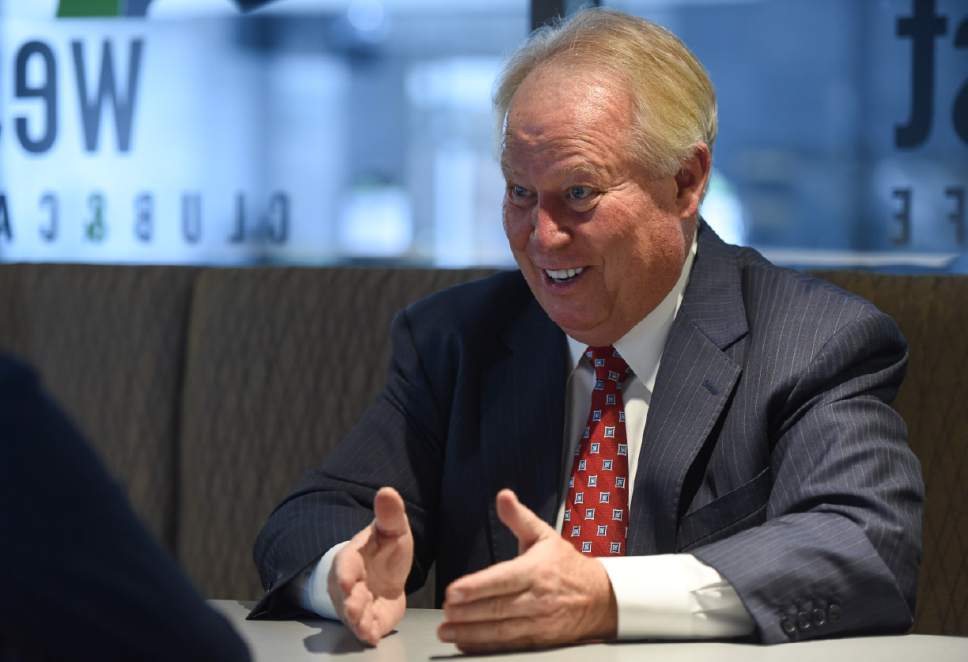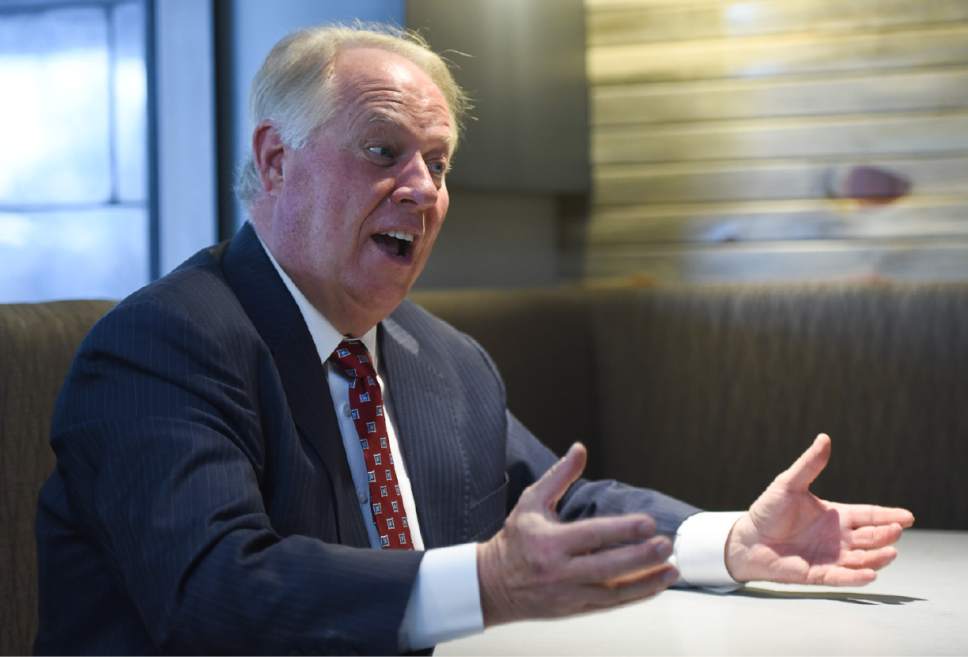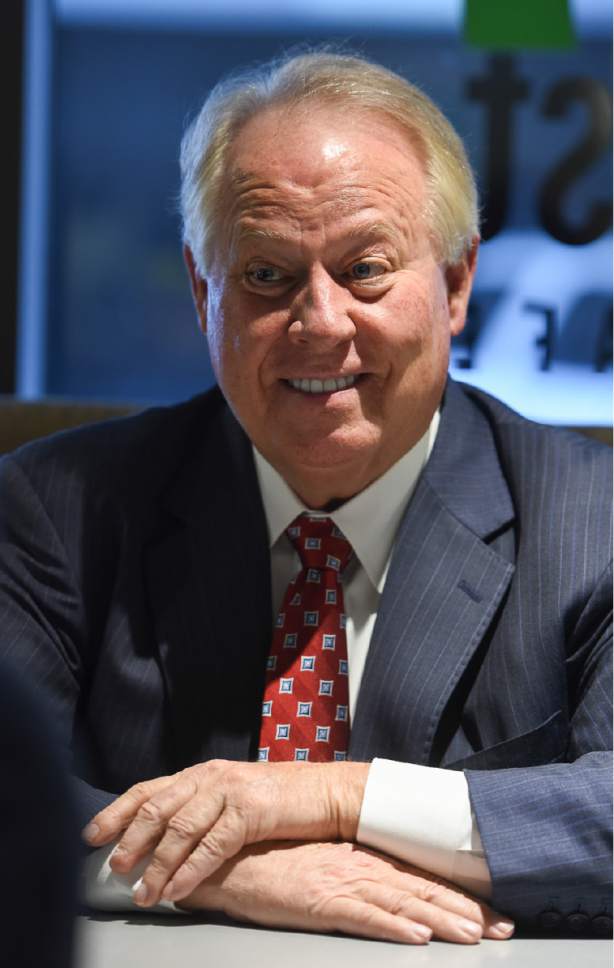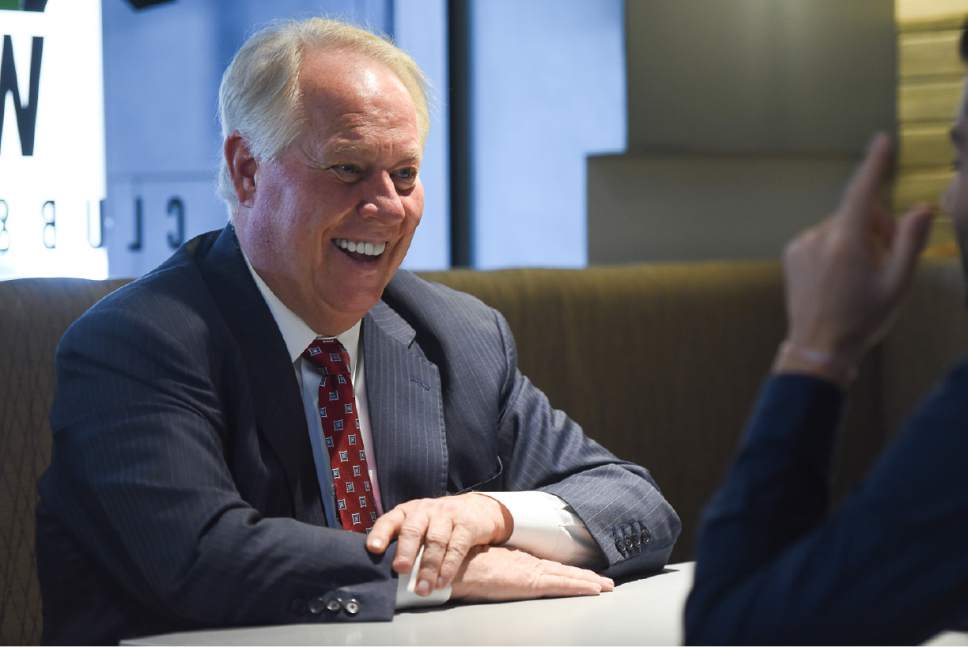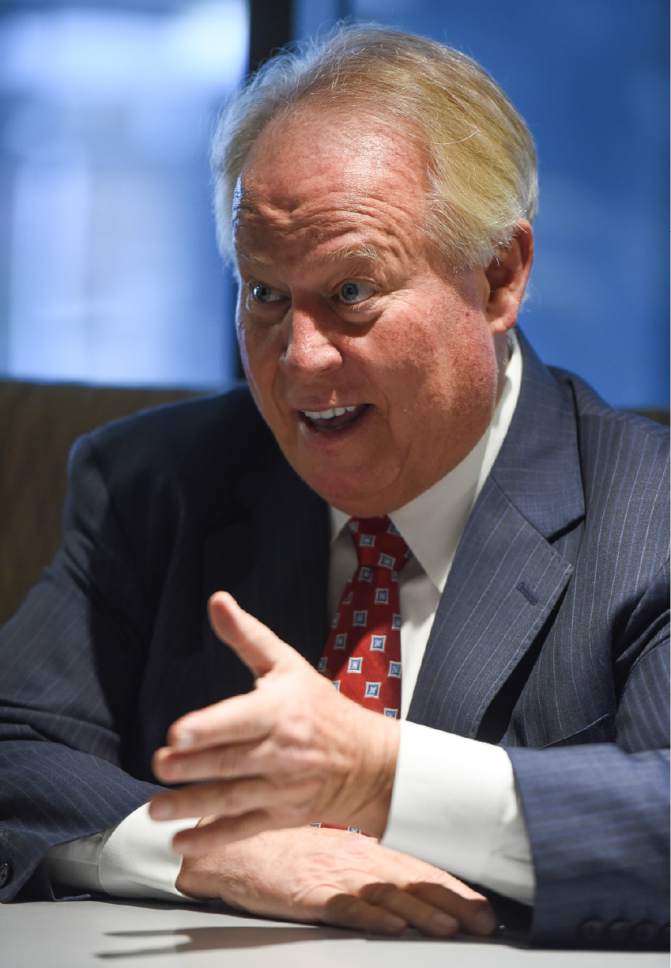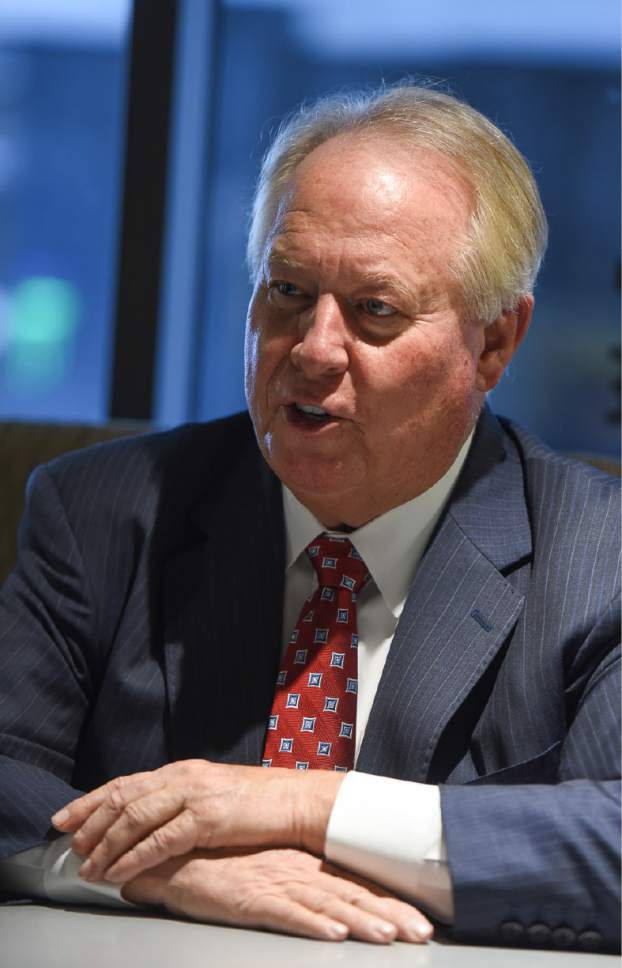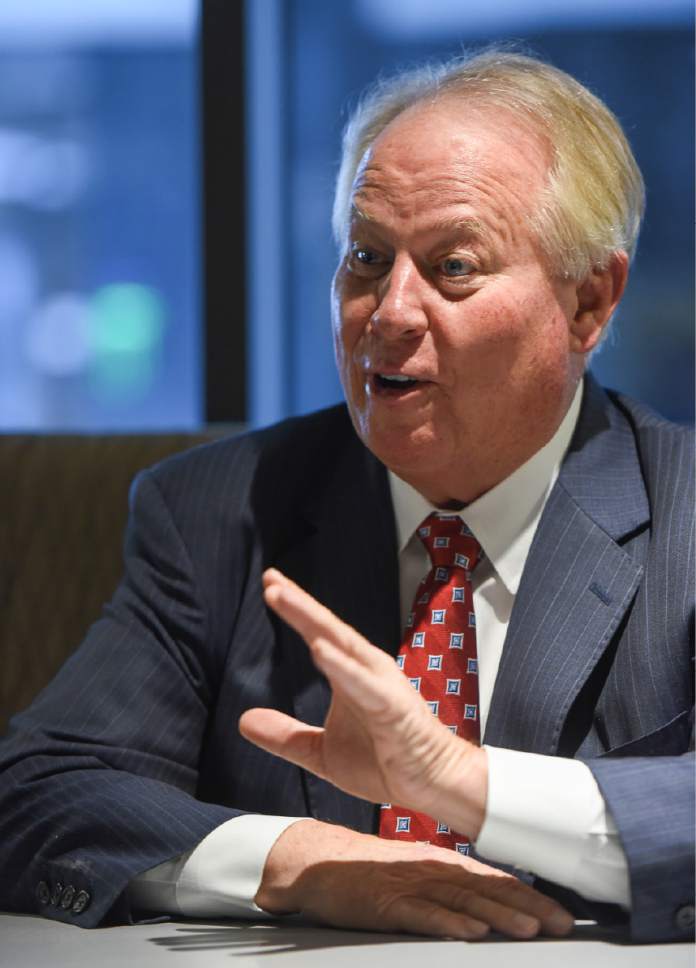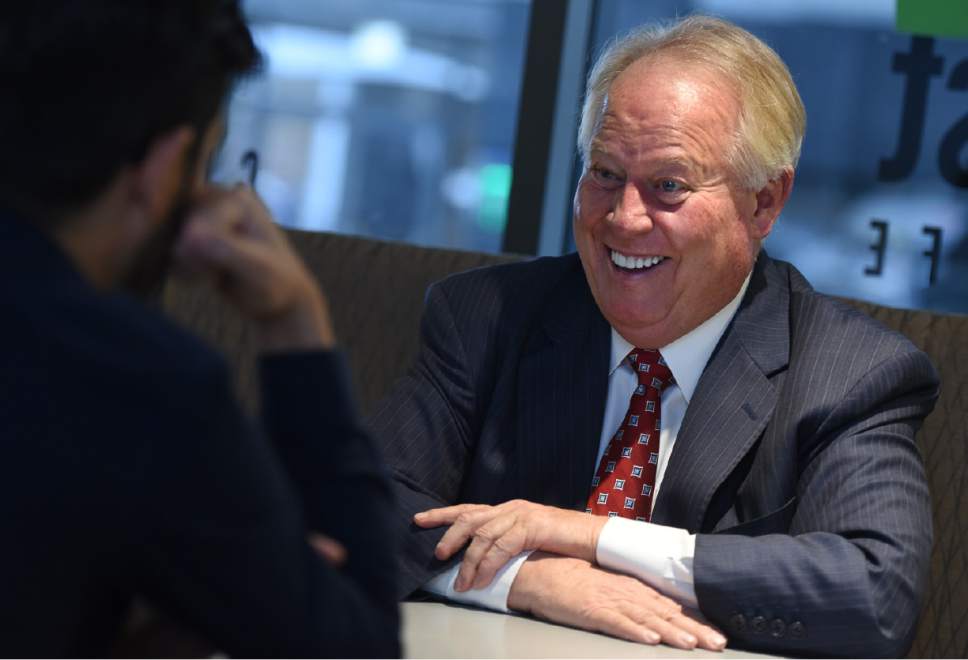This is an archived article that was published on sltrib.com in 2017, and information in the article may be outdated. It is provided only for personal research purposes and may not be reprinted.
Dell Loy Hansen, RSL's ambitious, candid and sometimes controversial owner, ponders the question.
Is Dell Loy Hansen a difficult owner to work for?
He makes a quick joke then pauses briefly. He doesn't break eye contact.
"I'm a demanding owner. I have high expectations."
Which isn't abnormal. Not in the business of professional sports or to a guy like Hansen, reportedly worth in the billions having made his way in the world as a real estate tycoon in his home state of Utah.
Hansen is seated in a corner booth inside of an empty restaurant early one morning. He's been at Real Salt Lake longer than any other front office figure or coach. He is not Nick Rimando or Kyle Beckerman, but his constant presence is more important now amid all the change he's responsible for.
The show is most definitely his.
It had been a hectic week in RSL Land. At the forefront of it all is Hansen.
The call was made Monday by Hansen and general manager Craig Waibel to fire Jeff Cassar three games into the 2017 season, changing the landscape of not only a young season but the future of the club. RSL hadn't fired a coach or front office figure since 2007. This was Hansen's first major firing as owner. And it is the latest bout of change under Hansen, who took over full ownership from founder Dave Checketts in early 2013.
"There was no question that the bar entering this year was an absolute bar we had to meet," Hansen said.
It appeared the bar wasn't close just three games in. So Hansen made the move.
"The thing that I believe is fairness," he said. "You can judge people prematurely."
Now he finds himself in the middle of a coaching search in late March. MLS, Hansen is quick to remind, is not the league it was in 2009 or 2010 when RSL was at its height of success. He calls it "the storied hour" for that era of RSL.
Since? "Everything has changed," he said.
Not only in MLS, but at RSL. Cassar joins departures such as Jason Kreis, Garth Lagerwey and Bill Manning. Hansen vows he's willing to shell out whatever it takes to land the right guy to lead the franchise moving forward. "Money has never been the object," he said in his familiar confident tone.
Current stage of Hansen's RSL
Hansen took notice as the scoring continued to dry up on the field. The lack of balls in the back of the net became a common theme, a theme the RSL owner struggled to look beyond. Hansen has no shortage of goals for the organization.
RSL has deepened its investment in its academy and other levels of the club since Hansen took over full-time. He "reorganized the side," he said. He veers away from the team management but has put in the most time developing RSL's economic base. According to Hansen, RSL's annual sponsorship revenue was at $2.9 million when he bought in in 2009. He said RSL moves across $14 million in 2017.
The transition Hansen believes in continues from what he describes as a "Ma-Pa" team with a singular focus for a franchise laying its roots deeper into the youth soccer system. The investments, he said, will make RSL more competitive in the long run. Hence, the estimated $50 million Herriman soccer complex, which will become the home of the RSL academy teams, first team and Real Monarchs. By the time the complex is completed next spring, there will be 90 full-time employees — double what it was in 2010, he said.
"The part of it is that we change often would beguile the facts — that we change the necessary, I think, is the reality," he said.
Heat on Hansen has been dialed up a bit in recent years from a portion of the fan base due to the departure of high-profile names associated with said glory years.
"I don't read anything," he said. "I don't read newspapers, I don't read blogs. When I walk around the stadium, I have yet to have a person say a negative thing to me ever. I have one radio host that tends to be a real pain in the a—, but that's about the only one I know."
Hansen proudly boasts about the five U.S. U-20 national team members from the RSL academy. That's part of the necessary evolution to establishing an empire. He added that the next coach must be willing to take on more than a roster with the pressure of postseason aspiration. The next coach will be tasked with implementing a system and style that translates from the stars inside Rio Tinto Stadium to the 7-year-olds learning how to excel as a right wing.
"I feel good about where we are — very good, actually," he said.
'Life quit being about money a long time ago'
He calls his gradual association with soccer and RSL "a strange quirk of fate." Hansen believes he's leading a soccer revolution in Utah, joining the explosion of popularity in the sport across the country. MLS is expected to expand to 28 teams in the near future, and it's a point of pride for the Cache Valley kid to see Utah part of that growth.
"We get to stand with the best of the best of them," he said.
RSL has become a healthy obsession. Although if 2017 Hansen could give 2013 Hansen advice about life as a professional sports owner, he'd tell him, "If you want any free time, don't buy one." Hansen's sell over the last couple of years has been the academy, moving it north from Casa Grande, Ariz., and fusing the franchise into one building.
"I do know where the next 10 years should lead," he said.
The integration he speaks about goes beyond RSL. Hansen said he recently donated $750,000 to the Utah Valley University men's soccer program to help with its stadium facilities. He plans on Salt Lake Community College's teams playing their games at the Herriman complex when it's finished. RSL has poured more money into fan-experience infrastructure, Hansen says, but he realizes that with the rapid rate of MLS competition, more money will be demanded of owners such as himself to stay competitive not only within the league, but on the world market.
Hansen estimates he's spent "way north of $100 million" on RSL since joining ranks in 2009.
"The more you know me, I'm a total realist," he said. "I look at the world for what it is, not what I would like it to be. And then I operate from what I know it is and then I get what results I can from the is and not the wish. And if people get around me for any time at all, they'll find that I know what Utah is — it's amazing."
One of the reasons he bought RSL, he said, was watching the impact the Miller family had when it bought the Jazz in the 1980s. The Millers invested heavily, rode out the losing seasons and turned it into something. "I will never take a dime out of Real," he added.
"Life quit being about money a long time ago," he said. "I met my needs some years ago. I met my simple wants some years ago."
There is much more work to do. Franchise-altering work that Hansen understands he must get right sooner than later.
Twitter: @chriskamrani —
The Dell Loy Hansen era
October 2009 • Joins the RSL ownership ranks, serves as vice chairman and alternate governor of RSL
January 2013 • Hansen acquires complete ownership from inaugural owner Dave Checketts
December 2013 • Jason Kreis leaves RSL after nine years with the club; Jeff Cassar hired as his replacement
December 2014 • Longtime GM Garth Lagerwey sees contract expire, joins Seattle Sounders; former RSL assistant coach Craig Waibel hired as technical director
August 2015 • RSL, president Bill Manning part ways; Waibel named general manager
April 2016 • RSL unveils plans for estimated $50 million soccer complex in Herriman
August 2016 • RSL breaks ground on Herriman soccer complex, which will house academy teams, Real Monarchs and RSL first team
March 2017 • RSL fires Jeff Cassar three games into 2017 season; Daryl Shore named interim coach


